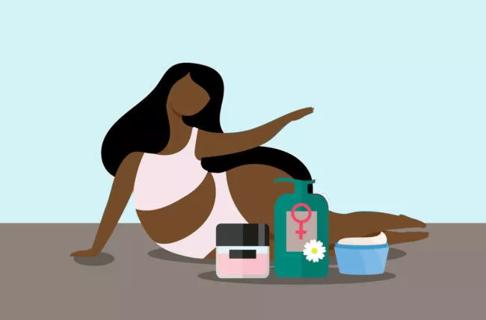How to tell when odor is a warning sign

You’ve probably seen scented feminine products in the aisles of your local drug store and wondered if your particular fragrance “down there” is OK? If you’re feeling self conscious about your odor, does that mean your vagina is in need of some freshening? Many women claim that douching makes them feel cleaner, eliminates embarrassing odor and protects them against infection. But they may be doing harm to themselves along the way.
Advertisement
Cleveland Clinic is a non-profit academic medical center. Advertising on our site helps support our mission. We do not endorse non-Cleveland Clinic products or services. Policy
“Douching is not advised because the vagina is a self-cleaning organ,” says nurse practitioner Molly Gumucio, CNP. “When you try to cleanse it yourself by using a douche, you actually flush out the normal, healthy microbes as well as temporarily change the pH, which changes the acidic vs. basic nature of the vagina.”
Additionally, all douche formulations — save for the pure saline varieties — contain ingredients that could trigger an adverse or allergic reaction.
The term, douche, which means “to wash” or “to shower” in French, refers to cleansing the vagina using a solution of water mixed with another fluid — often vinegar, baking soda or some sort of perfume.
Rather than providing protection, douching sets up an environment that makes it easier for infections to develop. Douching can also lead to health problems like pelvic inflammatory disease and vaginal irritation too. Additionally, all douche formulations — except for the pure saline varieties — contain ingredients that could trigger an adverse or allergic reaction. Ouch!
“Vaginal odor can be a big concern for some, but it’s actually normal to have some odor,” Gumucio says. “It’s also normal to have the odor change in nature and intensity throughout your menstrual cycle.”
Advertisement
It’s possible to notice more odor after making a change in diet, such as eating more garlic, tuna or if you just started to take dietary supplements. Once you stop consuming the food or other products, the odor usually goes away.
Washing the outside area — the vulva — with deodorant soap can decrease the natural odor, but it may also dry out the sensitive tissue, so use those products with caution. Wash your vulva only with water, especially if you’re experiencing dryness, itching or burning.
Some odors may occur due to a health issue. “If you smell a persistent and foul odor, or if any odor is accompanied by a thick or greenish discharge, you may have an infection,” says Gumucio. “If you have pain, rawness or sores in your vaginal area, it’s time to consult your doctor.”
These odors and accompanying symptoms can arise due to a serious infection like gonorrhea, trichomoniasis, or chlamydia.
But, most commonly, the cause isn’t an infection at all.
Bacterial vaginosis, an imbalance of the various kinds of bacteria found in the vagina, can cause discomfort and odor as well. If you have this problem, your doctor will prescribe an antibiotic, which selectively affects only the anaerobic bacteria (bacteria that live without oxygen) and leaves the healthy bacteria intact.
Yeast vaginitis is what most people refer to as a yeast infection, but really occurs because of a bacterial imbalance that allows the yeast to flourish. Your doctor will prescribe one of several medications to treat the abundance of yeast and put the natural balance back in place.
Foreign objects like a tampon, condom or toilet paper can sometimes get stuck in your vagina and cause odor or discharge. To remove it on your own, relax your pelvic muscles and try to gently grasp the object. If you don’t have luck removing it on your own, don’t panic. A healthcare provider will be able to remove it for you.
“If you’re young and haven’t started your periods, yet have an odor, consult with your doctor first before attempting to treat it with an over-the-counter remedy,” Gumucio says.
Lack of estrogen can be the cause if you’re past menopause and are experiencing vaginal odor. Your doctor will be able to give you an accurate diagnosis and discuss treatment options.
Your vagina cleans itself, so avoid using a douche, which may actually harm vaginal health. See your Ob/Gyn annually for your well-woman visit and in between visits if you have any pressing concerns.
Advertisement

Sign up for our Health Essentials emails for expert guidance on nutrition, fitness, sleep, skin care and more.
Learn more about our editorial process.
Advertisement

Strong vaginal and groin odor is normal for many people — it can be the result of sweat, urine, infections and more

Infections, cysts and conditions like endometriosis can result in a host of symptoms like burning and itching

Yes, it could be a yeast infection, but there are also several other causes for an itch down there

Moisturizers, lubes and prescriptions can all be helpful

How to identify and treat vaginal conditions

It’s important to angle it toward your rectum or back, along the natural curve of your vaginal canal

To help manage symptoms, switch to more absorbent period products, make healthy lifestyle changes and explore treatment options

Yes, you can pee with a tampon in; no, they won’t stretch out your vagina or make cramps worse!

Even small moments of time outdoors can help reduce stress, boost mood and restore a sense of calm

A correct prescription helps your eyes see clearly — but as natural changes occur, you may need stronger or different eyeglasses

Both are medical emergencies, but they are very distinct events with different causes